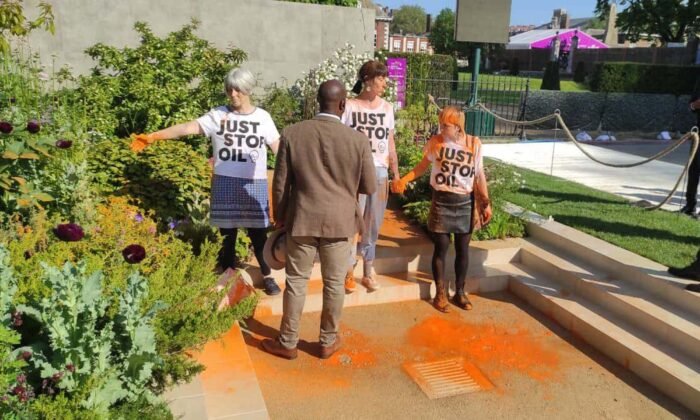Political Views Deemed Irrelevant in Court of Appeal’s Ruling on Criminal Damage Cases
Attorney General Victoria Prentis welcomed a ruling that ‘political or philosophical beliefs’ are irrelevant in criminal damage cases.
The Court of Appeal in London has ruled climate change activists and other protesters cannot use their “political or philosophical beliefs” as a defence if charged with criminal damage.
Three judges ruled that a climate change activist’s defence, which led to their acquittal, claiming that a property owner would have consented to damage if they had been aware of the full impact of climate change, was deemed “too remote” to be considered a “lawful excuse.”
The individual, identified only as XX for legal reasons, successfully utilized the defence, prompting Attorney General Victoria Prentis to request a review of the law’s application during the trial.
On Monday, Lady Chief Justice Baroness Carr, alongside Lord Justice William Davis and Mr. Justice Garnham, ruled that the “time, place, and extent” of the damage were the only “circumstances” relevant to the prosecution.
Baroness Carr, the most senior judge in England and Wales, stated, “The circumstances would not include the political or philosophical beliefs of the person causing the damage.”
She further explained, “They would not include the reasoning or wider motivations for the damage. These matters are too remote from the damage. Evidence from the defendant about the facts or effects of climate change would be inadmissible.”
XX’s acquittal will not be overturned by the ruling, but moving forward, the defence will not be available to protesters.
Protesters Do Not Have ‘Free Rein’ to Publicize Cause in Courts
In the court’s written judgment, Baroness Carr expressed, “It was not Parliament’s intention … to give protesters free rein to publicize their cause through the criminal courts.”
She also emphasized that the law “was not intended to afford a defense to protesters based on the merits, urgency, or importance of their cause, nor the perceived need to draw attention to a cause or situation.”
Baroness Carr clarified, “’Circumstances’ in the phrase ‘the destruction or damage and its circumstances’ do not include the merits, urgency, or importance of the matter about which the defendant is protesting, nor the perceived need to draw attention to a cause or situation.”
Ms. Prentis welcomed the ruling, stating, “Climate change is an important issue, and while the right to protest must be protected, it does not give a right to cause serious criminal damage, no matter how strongly held a belief is.”
She added, “Today’s judgment is important as it ends any uncertainty over when a person has a lawful excuse to cause damage because they honestly believed the property owner would consent.”
Ms. Prentis, Conservative MP for Banbury in Oxfordshire, affirmed, “It clarifies that the importance or merits of a protest are not the ‘circumstances’ of damage caused during that protest.”
Attorney General Says Law Needs to Be Applied ‘Consistently’
“It is essential that these cases are dealt with consistently, so we welcome the court’s ruling, which will ensure consistency and give judges much-needed clarity in this important area of law,” she added.
During the February hearing, Mr. Little argued, “We submit that it is being used in a way that was not envisaged and indeed was not intended by Parliament. It leads to the conclusion that this law is being interpreted too broadly and in reality wrongly.”
He also highlighted the fallacy of leaving this defense to the jury in many cases, focusing on whether the property owner could have consented rather than whether they would have consented.
Mr. Little temporarily paused prosecuting a separate case to handle the Court of Appeal case for the attorney general.
Henry Blaxland, representing XX, contended, “The consequence is that where the defense was raised, the sole question of fact for the jury is whether the defendant had an honest belief that the owner of the property would have consented to the damage caused. It is not for the jury to determine whether the belief has merit.”
PA Media contributed to this report.





